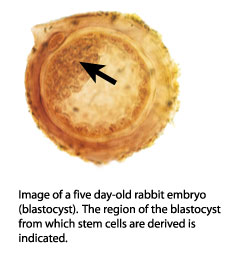
What are stem cells?
Stem cells are unspecialized cells that are thought to be able to reproduce themselves indefinitely and, under the right conditions, to develop into mature cells, e.g., nerve, skin, pancreas, with specialized functions. They are found in embryos at very early stages of development (see figure) and in some adult organs, e.g., bone marrow and brain.
 Human
embryonic stem cells were successfully grown in the laboratory for the
first time in 1998 and since then have been shown to differentiate into
a few different types of tissue under controlled laboratory conditions.
Isolating adult stem cells is very difficult, and promoting their growth
outside of the body is not yet easily accomplished. Moreover, it is not
yet clear that adult stem cells are as pluripotent or versatile as embryonic
stem cells, i.e., that they can be directed to become the wide variety
of tissue types that embryonic stem cells can become. Nor is it clear
that embryonic stem cells can be used without difficulty as sources of
“replacement parts” for all types of diseased or damaged tissue.
Human
embryonic stem cells were successfully grown in the laboratory for the
first time in 1998 and since then have been shown to differentiate into
a few different types of tissue under controlled laboratory conditions.
Isolating adult stem cells is very difficult, and promoting their growth
outside of the body is not yet easily accomplished. Moreover, it is not
yet clear that adult stem cells are as pluripotent or versatile as embryonic
stem cells, i.e., that they can be directed to become the wide variety
of tissue types that embryonic stem cells can become. Nor is it clear
that embryonic stem cells can be used without difficulty as sources of
“replacement parts” for all types of diseased or damaged tissue.
And there are dangers associated with stem cells. For example, the ability of stem cells to divide might not be readily harnessed after transplantation; in other words they may continue to grow unabated and form tumors. Other possible negative reactions include the chance that transplanted stem cells might differentiate into the wrong type of tissue, or that they may be rejected by the recipient’s immune system. Although limited success in restoring lost function has been achieved in animal experiments, the ability to do the same in humans is far from being a certainty. Furthermore, there is opposition to using stem cells derived from human embryos because removing the cells results in death of the embryo. In the minds of many people destroying a human embryo, even at very early post-conception ages, is intrinsically immoral.
Science itself is neither ethical nor unethical, although the vast majority of scientists are highly ethical people. But a society needs more than scientists to make intelligent public policy decisions about how the fruits of scientific research may best be used. This is particularly true in our pluralistic society when there are honest disagreements about the ethics of even doing the research. The primary purpose of this conference is to examine, in layman’s language, some of the issues relating to human stem cell research. We hope to make the science comprehensible to nonscientists at some level and to examine the ethical and legal issues. We hold to the tenet that a healthy society needs an educated citizenry. Our aim is to encourage students and members of the community to become interested in how society should deal with a very complicated matter.
speakers | event description | genomics resources | directions | comments or q's | webcast
Organized by the Department
of Neurobiology and Physiology
Phone 847/491-5521 • fax 847/491-5211 • e-mail m-kennedy2@northwestern.edu
© 2001 Northwestern University World
Wide Web Disclaimer and University
Policy Statements
Revised
April 2, 2002